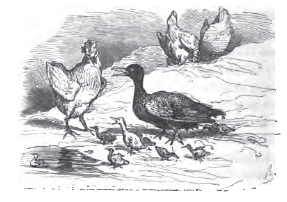‘The ugly duckling’ illustrated by Bertall (1820 – 1882);
Image source Wikimedia Commons
It is often assumed that the Humanities and Social Sciences disciplines is the open access’ ugly duckling’ lagging far behind the Science, Technology and Medicine collective. Whilst this may be true in terms of the pure volume of open access articles and journals published (in part due to both support and pressure from research funders), this is certainty not true in innovation, for example the hugely successful Open Humanities Press which publishes well-regarded open access books, and grassroots interest from academic staff.
A lot of recent attention and dialogue has focussed on some of the negative attitudes shown towards open access in the Humanities and Social Sciences, whilst a lot of the positives have been under reported and ignored. I would like to take the time to dwell on some of these and show the potential HSS has to become a beautiful open access swan.
Specifically, I have been intrigued by two encouraging phenomena in the social and behavioural sciences and the humanities; Firstly, the blossoming number of Library-Academic partnerships producing new journals, and secondly the rise of the cross-discipline ‘super’ journal.
Library-Academic owned Open Access Journals
The HSS grassroots interest is wonderfully demonstrated by the number of new Open Access Journals being set up (using the Open Journal Systems platform) by academic staff in partnership with their University Libraries. Some excellent examples include the University of St Andrews Library Journal Hosting Service which publishes the following titles:
- Ethnographic Encounters
- Journal of Terrorism Research
- Theology in Scotland
and the University of Edinburgh Journal Hosting Service which currently publishes:
- Res Medica
- The South Asianist
- The Unfamiliar
You will notice that five out of the six titles listed here are from the HSS domain, and this trend is set to grow further with at least another two HSS journals in the pipeline to be published via these platforms this year.
So why are HSS academics more active in this space above and beyond other subject disciplines? Perhaps the Library has developed closer relationships with HSS academic staff, maybe HSS academics feel they are not being catered for adequately by publishers and feel the need to provide their own publishing options. I don’t know the answer, but I am extremely encouraged by these developments. It shows there is a fundamental interest in making HSS research open access, albeit perhaps in a different way that people expect.
Cross discipline ‘super’ journals for the Humanities
Another growing trend we are seeing in the Humanities & Social Science is for both traditional and unconventional publishers attempting to provide a format of large, cross-discipline, open access journal which publishes original research and review articles similar to the PLoS One model. This was beginning to happen organically but seems to have been kickstarted by the Finch report and corresponding RCUK policy.
The first initiative I noticed was Sage Open which published its first issue in 2011. Unlike the sciences this open access journal has adopted an extremely low article processing charge to reflect the relative levels of funding available in HSS disciplines. The APC is discounted for institutions that have taken out subscriptions to their journals. This is an interesting approach not seen elsewhere, and offers an incentive to keep the subscription renewed.
Other similar initiatives have taken alternative approaches for funding. The Social Sciences Directory and the Humanities Directory were launched in 2012 by a small independent publisher. The business model they are promoting is a yearly modest institutional membership fee which would enable all authors from that institution to publish for free at point of use. At the time of writing this article both directories were trying to gain traction: the Social Sciences Directory has published a couple of articles and the first issue of the Humanities Directory is yet to launch.
Palgrave Macmillan is another well-established commercial publisher that is actively experimenting with new publishing models. They have recently announced paid for open licences across all of their content, including monographs and Palgrave Pivot – a mid-length format (midigraph?) pitched somewhere between a journal article and a monograph. There are plans to expand this open access offering in 2013 with the launch of a fully open access journal, accepting articles from across the Humanities and Social Sciences.
Finally, I would like to mention the Open Library of Humanities. This is an independent initiative owned and led by the academy with the aim of building a low cost, sustainable, Open Access platform for the Humanities, similar in vision to the well established Public Library of Sciences. (Full disclosure – I am on the LibTech committee for OpenLibHums and wish to see it become a fully fledged successful enterprise). Summary remarks
‘The ugly duckling’ illustrated by Bertall (1820 – 1882);
Image source Wikimedia Commons
I think that the social sciences and humanities is far from being the open access ‘ugly duckling’ that many people unfairly consider it to be. It is clear that there is an appetite from publishers, academics and libraries to change the way scholarly publishing works in the Humanities and Social Sciences by embracing the open ethos. Most people recognise that the current status quo is unsustainable; however, for meaningful change to happen a critical mass of authors, editors and reviewers need to be ready to participate. Similarly the financial figures need to add up and be sustainable in the longer term for all involved, including scholarly societies, libraries and publishers. Far from being the threat that many people think open access is; I think the future looks very encouraging for the open access swan that is the Humanities and Social Sciences.

